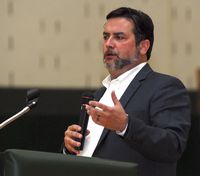Subscriptions
Menu
Advertisements
Attorney turned heroin addict says there's no magic cure
6/6/2017 |
By Jim Poole |

Getting hooked on heroin is hell, according to Andrew James McKenna.
He should know.
A former heroin addict, bank robber and federal prisoner, Mr. McKenna spoke at Middleburgh Central School Thursday about the dangers of heroin and how to fight addiction.
Middleburgh’s Roundtable, the parent-teacher organization for the middle and high schools, arranged Mr. McKenna’s visit. It came after two MCS alumni died after opioid use earlier this year.
Mr. McKenna’s addiction started with painkillers for a back injury and gradually grew to pill-popping, then injections.
At the same time, however, he was a successful professional: Marine Corps captain, then an attorney for the Judge Advocate General’s Office and Justice Department prosecutor.
Still, heroin brought him down.
“I went from pills to heroin,” he told the audience of students, parents and law-enforcement reps, about 60 in all.
“That was a game-changer.”
His habit progressed even though Mr. McKenna was an attorney and prosecutor.
Once on heroin, “the decision to use or not use isn’t in the mix,” he said. “You wake up in the morning and ask, ‘who do I have to rob?’ or ‘who do I have to lie to?’
“You always get a little more than you need because your life sucks.”
Mr. McKenna robbed six banks to support his habit. He was arrested, convicted, and spent six years in prison.
Released from prison four years ago, Mr. McKenna, who lives in Schenectady, is now a crusader against heroin and addiction.
His advice against those evils is simple: Don’t start.
“Prevention, prevention, prevention. That’s the key,” Mr. McKenna said.
One effective motto came from a long-ago First Lady, he added.
“It was Nancy Reagan who started the slogan, ‘Say no to drugs,’ ” Mr. McKenna said. “Some people thought that wasn’t strong enough. Really?
Prevention is vital, he said, because getting off heroin is so difficult. Saying there is no magic cure, Mr. McKenna said a variety of programs are necessary because “not one size fits all.”
He urged the audience to be on the lookout for unusual behavior among children and friends.
Norine Hodges, director of the Schoharie County Council on Alcohol and Substance Abuse, was in the audience. She asked what to do if someone observes “unusual behavior.”
“The last thing you want to do is yell at them,” Mr. McKenna replied. “When we confront with love and compassion, more often than not, we’re going to win.”
Talking about the problem is also essential, he added.
“Try to give encouragement,” Mr. McKenna said. “Lift each other up. Look out for each other more. It sounds Pollyannaish, but it’s the truth.”
The audience also heard from Pat Costello, whose son died from opioid use a month ago.
“I do not wish this on anybody,” an emotional Mr. Costello said. “We see it far too often in Schoharie County.
“We need to become more active. We need to give these kids a hand.”









